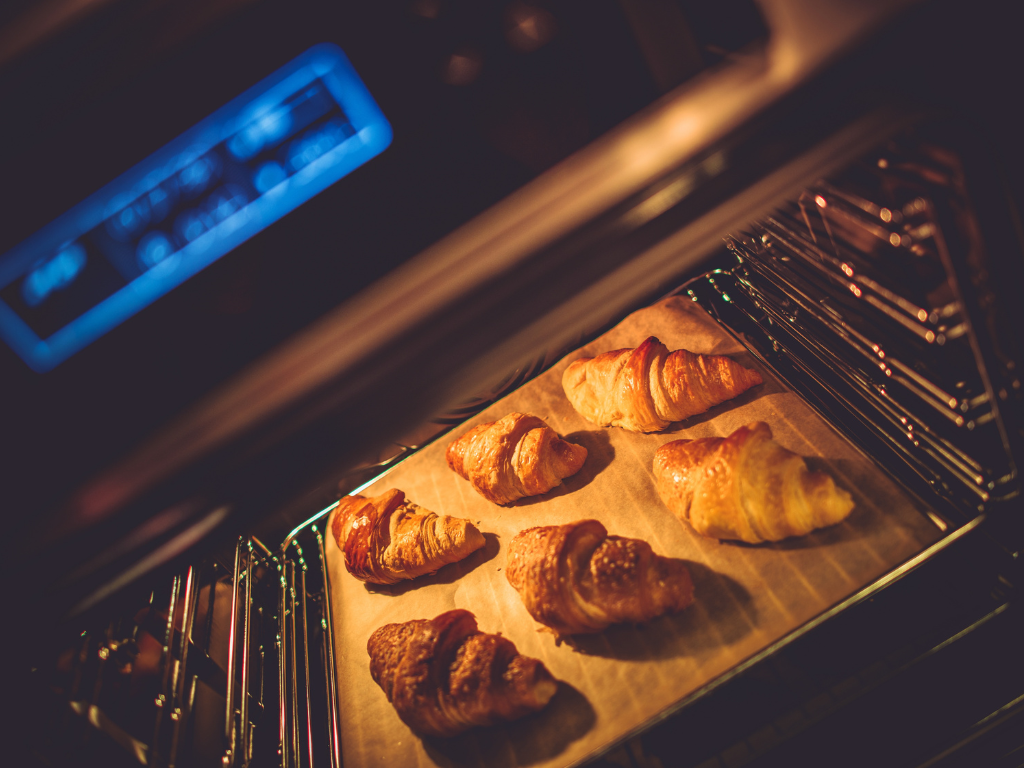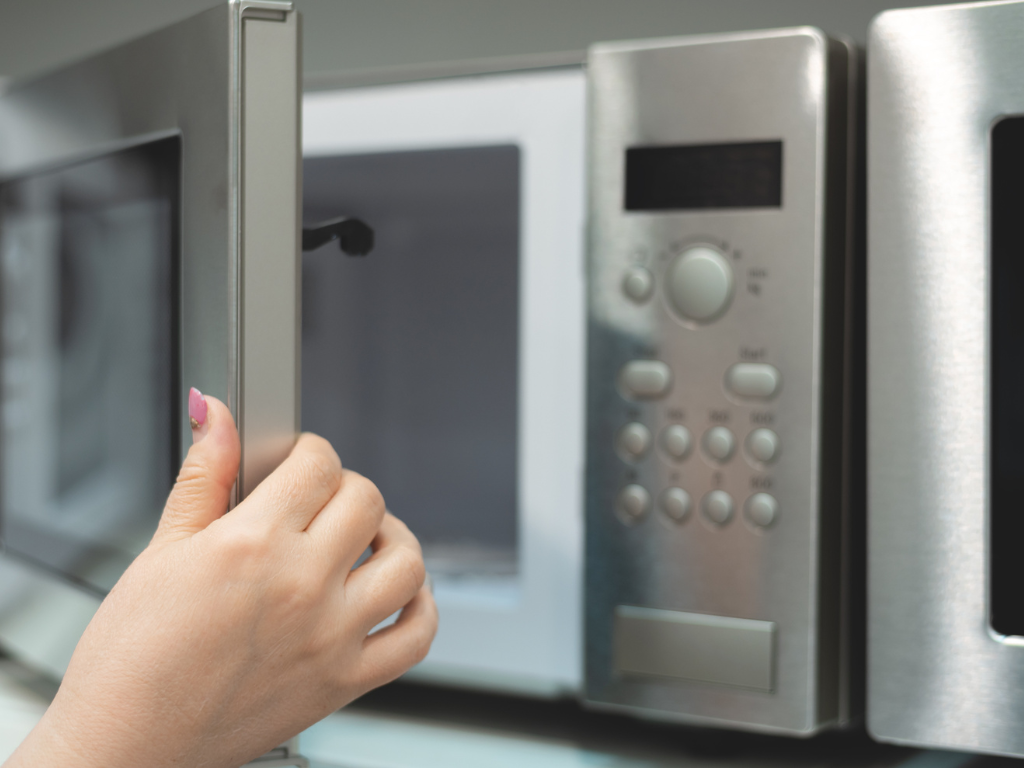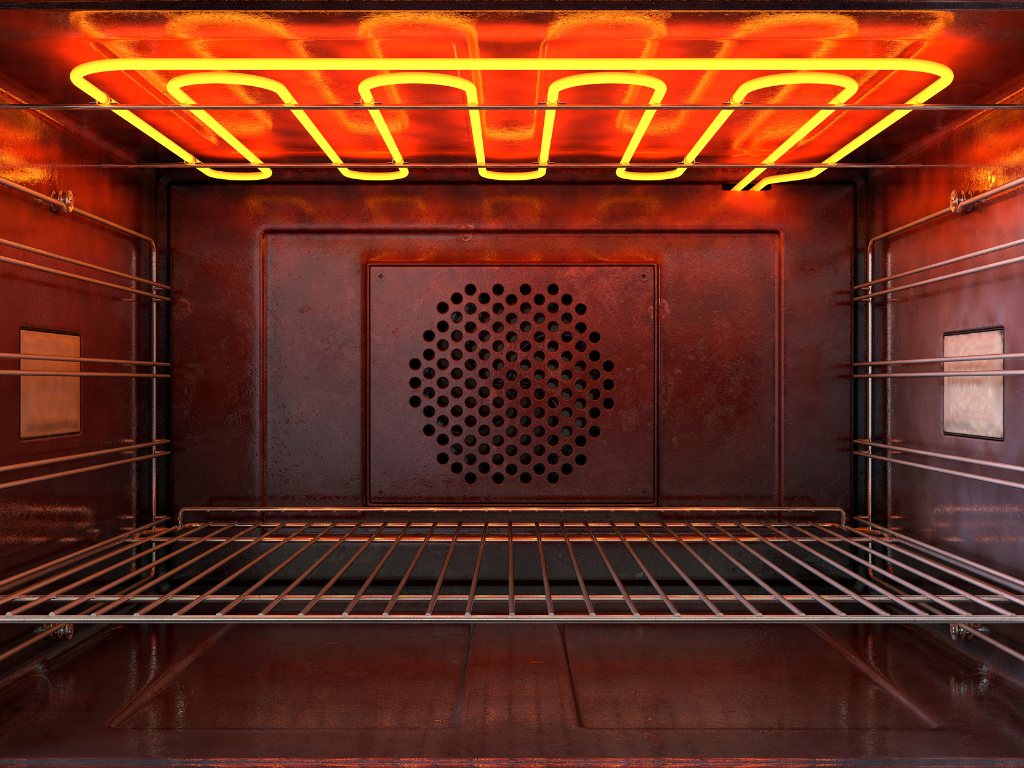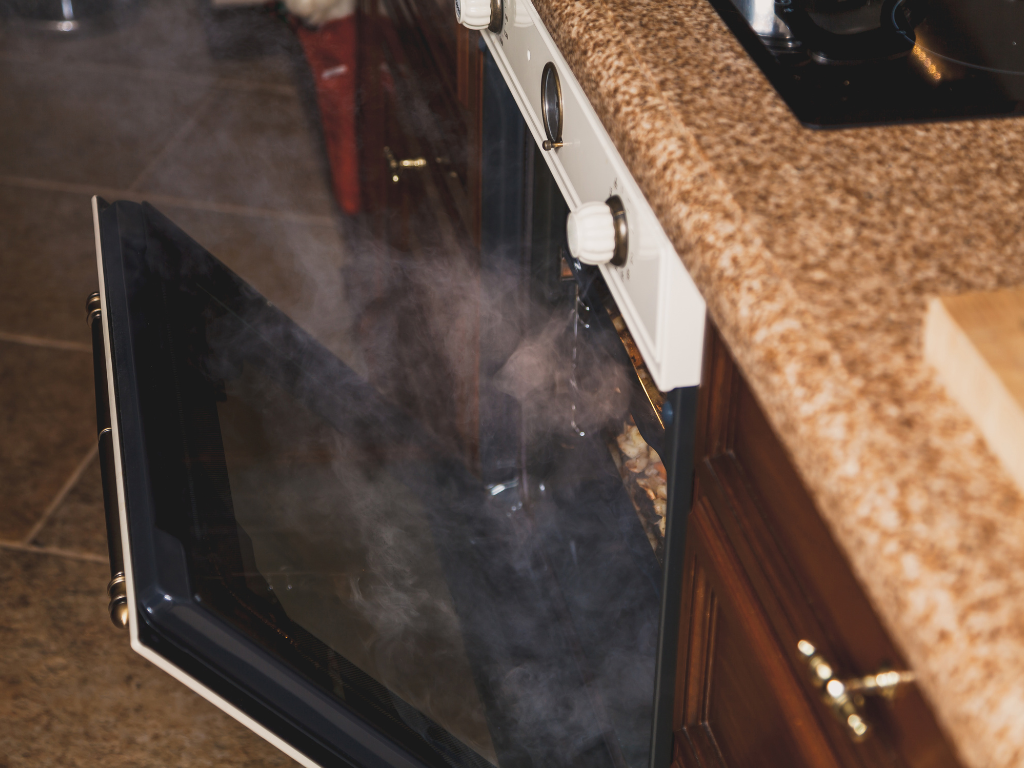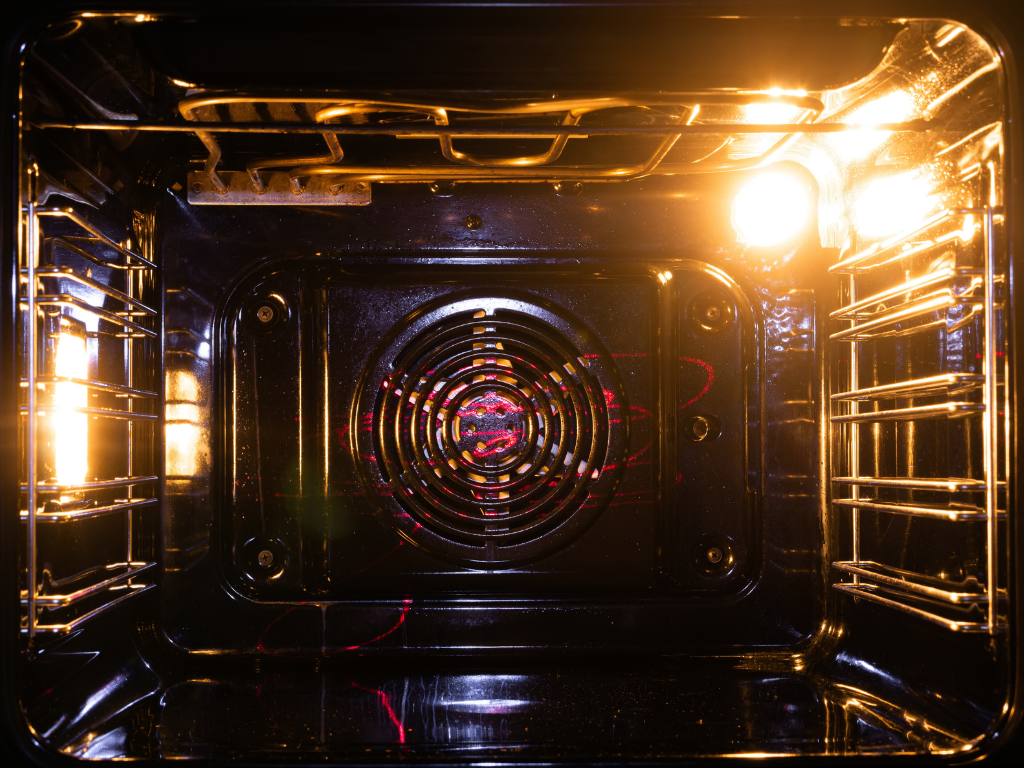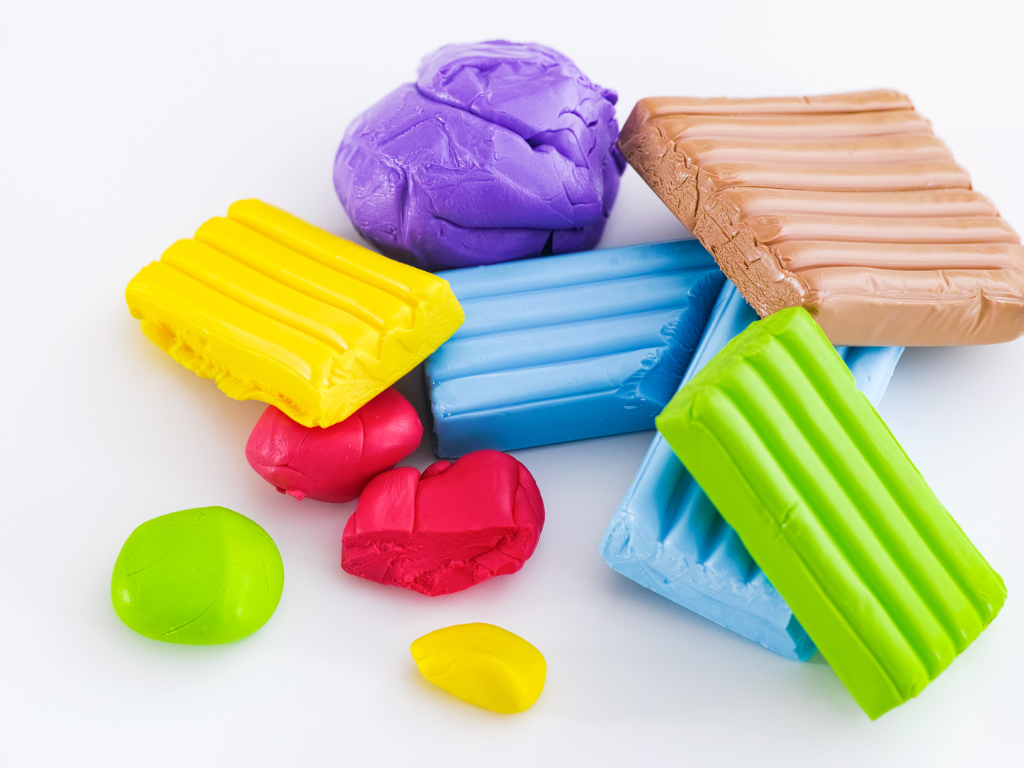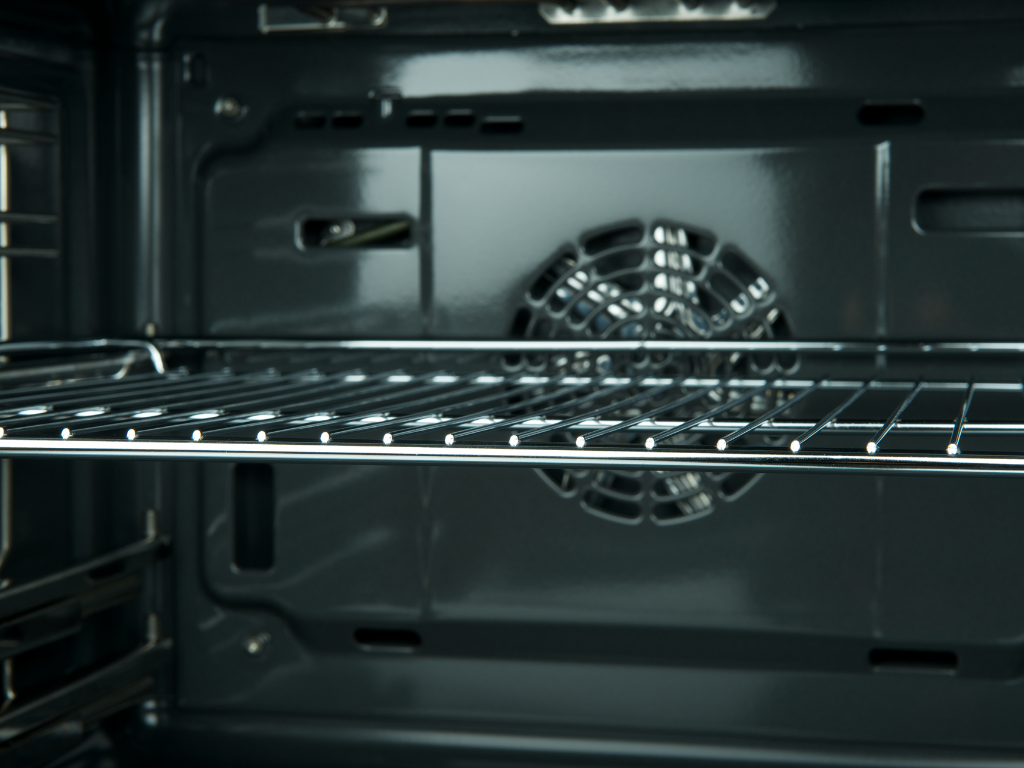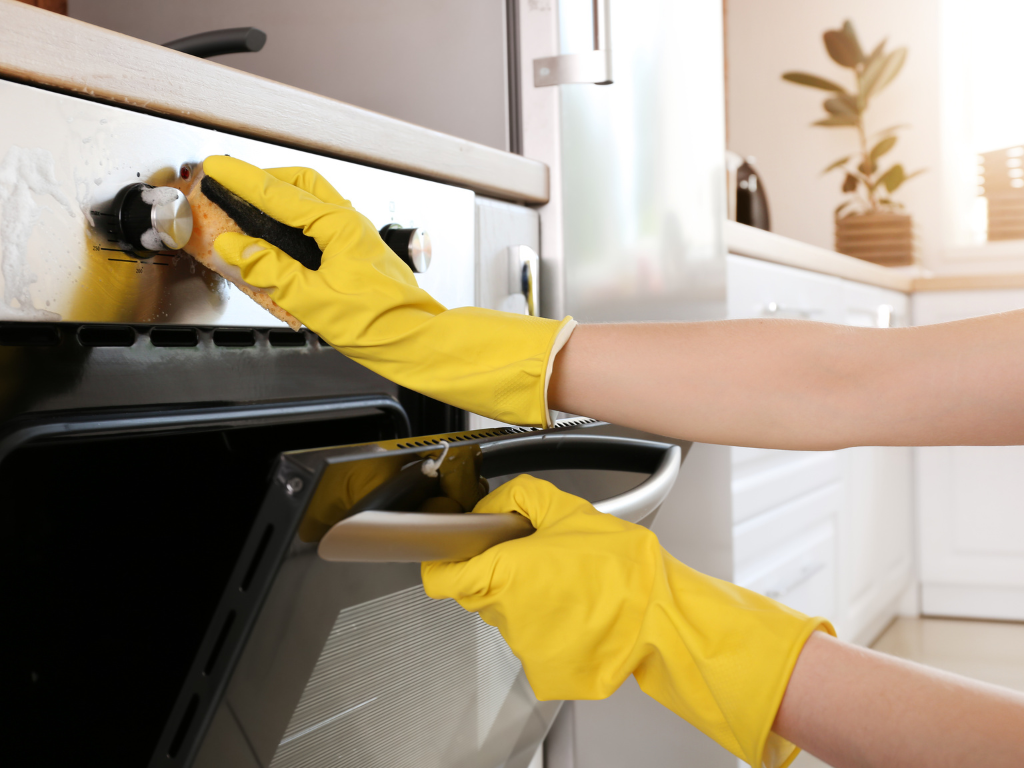Key Takeaway:
- Leaving an oven on when not home is a leading cause of home cooking fires. It’s important to practice oven safety and take necessary precautions to avoid such fires.
- Dangers of leaving an oven unattended include common causes of oven fires, risk of carbon monoxide poisoning, and potential electric oven risks. To avoid these risks, it is best to never leave an oven unattended, especially when not at home.
- Steps to preventing oven fires include regular cleaning, proper ventilation, avoiding the use of inappropriately sized cookware, and not leaving the oven unattended. In case of an oven fire, turn off the oven and use a fire extinguisher. It is also important to understand some common FAQs about oven safety, such as the importance of avoiding leaving an oven on for a long time and always ensuring that the oven has an automatic shut-off.
Worried ’bout the oven when you’re not home? Fret no more! This article’ll tell you all you need to know. Which safety steps to take and mistakes to avoid. Get ready for a kitchen experience safe and secure!
Introduction
Oven Safety Tips for Unattended Cooking
Leaving the oven on when not at home raises concerns on potential fire hazards. It is important to consider the type of oven being used, gas or electric, and the possible risks of using toaster ovens. Carbon monoxide poisoning and electrical malfunction are also factors to consider. To prevent oven fires, proper kitchen appliance repair and cleaning methods should be practiced. Unique details include preventing fire by avoiding placing pizza directly on oven racks, cleaning burnt sugar, and knowing the weight limitations of ovens. A true story involves an incident where an unlocked Whirlpool oven caused a fire.
Leading Cause of Home Cooking Fires
Home fires caused by cooking are most commonly started due to leaving the oven or stove unattended while food is being prepared. Coal and Gas ovens are more prone to causing such incidents as they have sensitive temperature control, which results in heating for a longer time, and the heat’s damage may gradually increase. In addition, the use of oil and fats while cooking increases the risk of home cooking fires as they catch fire quickly at a high temperature. The use of baking paper or parchment paper can also cause a fire if left in a heated oven.
It is essential to take precautions while using gas ovens, like cleaning them regularly, checking if they turn off automatically after use, not placing aluminum pans inside and much more. Furthermore, overloading the oven with multiple dishes simultaneously should be avoided. In electric ovens, wire mesh should not be used because it heats up faster than normal utensils. Cool metallic cookware is best for such ovens.
Polymer clay is unsafe to consume; therefore, it should not be used in ovens where food will be prepared later on. Similarly, resin mats or molds are also advised not to be put into an oven unless their heat tolerance capacity is known. If there are still doubts about their performance under heat conditions consult with manufacturers before putting them inside.
To reduce the risk entirely of kitchen-related home fires, don’t leave the kitchen unattended while gas burners or electric stovetops are in use. Always set timers when baking, to avoid forgetting. After removing dishes from the oven or stove, give some allowance time for cooling down before closed doors, reheat leftovers microwave instead of straight heating using Oven.
Importance of Oven Safety
Kitchen safety is crucial for every household, including oven safety. It is essential to ensure that the oven is used correctly and under supervision. Neglecting oven safety may cause fires, which can result in severe damages, injuries or even death. Therefore, it is vital to use caution when operating an oven.
When using an oven, always follow the manufacturer’s instructions carefully. Be mindful of the heat setting and how long you have been cooking for. Never leave food unattended in an oven – this may lead to fire hazards. Also, avoid putting objects like plastic or paper inside the oven as they are prone to catch fire and contribute to overheating.
Another critical aspect of oven safety is its maintenance and cleaning. Cleaning spilled food or grease prevents them from burning up and causing smoke-filled rooms or fire outbreaks. Always unplug the appliance before cleaning it to prevent electrical hazards.
Lastly, when not in use, turn off the oven entirely instead of leaving it on for small heat output purposes like defrosting or keeping food warm. This will not only prolong your range’s life span but also prevent accidents.
Dangers of Leaving an Oven Unattended
Leaving an oven unattended can pose serious risks. The potential dangers range from fire hazards to carbon monoxide poisoning. Not only is it a safety issue, but it can also cause damage to the oven and surrounding area. It is essential to be aware of the risks and take necessary precautions. For instance, do not leave paper or other flammable materials in the oven while it is on. Additionally, never leave the oven on when not at home.
Leaving an oven unattended can also lead to food getting burnt or causing a mess in the oven. Burnt sugar can be particularly challenging to clean and it could damage the oven. It is important to clean spills and messes in the oven as soon as possible to avoid any further damage. Also, remember to set the temperature as per the recipe and not leave the oven on for an extended period.
It is crucial to consider the weight of the oven during installation or movement. Moving a heavy oven incorrectly can cause physical injuries or even damage the oven. Certain materials, such as aluminum pans or teflon, are not suitable to be kept in the oven. Mentioning the right cooking materials is important to avoid any accidents. It is also recommended to refer to the user manual before using the oven to avoid any mishaps.
In the past, there have been instances where leaving the oven on has caused a fire resulting in severe damages and injuries. A few precautions, such as turning off the oven while not at home or avoiding leaving flammable material inside the oven, could have prevented such incidents. It is essential to take proper measures to avoid any mishaps, making safety a top priority while using an oven.
Common Causes of Oven Fires
Oven fires can occur due to a variety of reasons, including leaving the oven unattended, using improper cookware, and faulty wiring. Cooking at high temperatures for extended periods, baking with paper products, or forgetting to remove food residue can also lead to unintentional fires.
Always read the manufacturer’s instructions before use and avoid using aluminum or glass cookware in high-temperature settings. Additionally, gas ovens can continue releasing heat even after being turned off due to a pilot light that remains lit. It is essential to regularly clean ovens from burnt sugar build-up between the door and baking elements as it can cause spontaneous ignition or malfunctioning of the oven. Pouring resin in the oven is not recommended as it releases toxic fumes when heated.
To prevent oven fires, always keep flammable items away from the oven and ensure there is adequate ventilation during cooking. Install smoke detectors near kitchens as a precautionary measure. If you experience electrical burning smells or notice mysterious white residue inside your oven – do not hesitate to schedule a professional diagnosis! Always practice safety habits when operating any appliance like ovens, especially when it comes to fire hazards that could put both yourself and your home in danger if left unaddressed.
Risk of Carbon Monoxide Poisoning
Cooking with an oven can be hazardous due to the risk of carbon monoxide poisoning. Carbon monoxide can leak from gas ovens, particularly if they are not well-maintained or ventilation is inadequate. Exposure to high levels of carbon monoxide can cause symptoms such as nausea, dizziness, headaches, and in severe cases, death. It is essential to take appropriate safety measures when using ovens at home.
To prevent carbon monoxide poisoning, make sure that your oven is clean and well-maintained. Clean burnt sugar from the bottom of the oven as soon as possible. If you have a gas oven, ensure that it gets sufficient airflow both for cooking and cooling purposes. Ensure you turn off your oven when not in use. Never leave an open flame on when you’re not around.
It’s important to check the functions on all types of top super automatic espresso machines before purchasing them. Super auto units come with unique features like adjustable cup height so that cups fit comfortably under a spigot; hot water dispenser; removable brewing unit for easier cleaning; and a steam wand to froth milk for lattes or cappuccinos.
One tragic history illustrates the importance of proper ventilation when using an oven. Back in 2013, a couple died from carbon monoxide poisoning in their apartment while their stove was running with plastic containers heating up on its burners. Toxic fumes from the burning plastic killed them after several hours-long exposure showing how careful we must be even with simple tasks such as cooking in our kitchens at home.
Electric Oven Risks
When it comes to the dangers of kitchen appliances, a topic that cannot be overlooked is the hazards posed by electric ovens. With their combination of high temperatures and electrical currents, these devices pose significant risks to users.
One major hazard is leaving the oven on when unattended. This can cause a fire or serious burns if someone accidentally touches a hot surface. In addition to this, there are other risks associated with electric ovens in general. For instance, they may produce harmful fumes when used at high temperatures, which can cause respiratory problems if inhaled over an extended period of time. If not cleaned regularly, burnt sugar or oil residue can create smoke clouds or even lead to fires. Additionally, some brands like Whirlpool or Samsung may require manual shut off instead of automatic turn-offs.
To ensure safety while using an electric oven, it’s important to adhere to certain guidelines and precautions. For instance, never leave the oven unattended for extended periods and do not use metal pans that are incompatible with the device as this could cause damage or accidents. Likewise, cleaning up areas around the oven will help you get rid of spilled oil or other materials that could ignite due to heat coming from an oven.
Pro Tip: It’s a good idea to check all connections and electrical wiring often and get them checked by a licensed technician routinely- ensuring most frequent questions like how long does an oven stay warm after turning it off? Is there anything I should consider before cleaning my self-cleaning oven? What is medium heat in an oven? are covered under your upkeep regimen- prior to use makes sense too because mistreatment inside electrical components can become extremely dangerous over time and threaten fire safety of everyone in your home.
Preventing Oven Fires
Preventing Oven Fires
To ensure the safety of your home and family, taking measures to prevent oven fires is crucial. Here’s how to significantly reduce the risk of oven fires.
- Keep your oven clean – regularly remove any burnt food, grease, and residue buildup in and around the oven.
- Do not leave your oven unattended – ensure someone is watching the oven at all times while in use.
- Regularly inspect your oven – check the wiring, heating elements, and thermostat. If any issues are noticed, contact a professional immediately.
Remember to also check the temperature when cooking to prevent flammable objects from igniting. By following these simple guidelines, you can prevent the devastating effects of an oven fire.
In addition, it’s important to know the right temperature for different materials to avoid any accidents such as paper burning in the oven. Also, do not use metal objects in a microwave oven and properly store flammable materials away from the oven.
Take action now to avoid the risk of a devastating oven fire and ensure the safety of your home and family.
Steps to Prevent Oven Fires
Preventing oven fires is crucial in maintaining a safe and functional kitchen. Here are practical steps to keep your kitchen safe from potential hazards caused by oven fires:
- Regularly clean your oven. A buildup of grease, oil, and food particles inside the oven can ignite when exposed to high heat.
- Avoid leaving flammable materials near the oven, such as paper or plastic. Keep combustible materials at least three feet away from the appliance.
- Do not leave your oven unattended when it’s in use. When cooking, stay in the kitchen and check on your food frequently to prevent fires caused by overheating or burning food.
- Install and maintain a smoke detector near your kitchen area. Smoke detectors can alert you quickly when there’s a fire in progress.
- Hire a professional if you notice any signs of malfunction or damage in your oven. Regular maintenance can help identify problems early on and prevent future safety hazards.
One important detail that hasn’t been discussed yet is to never put metallic objects such as aluminum foil or utensils inside the oven as they can cause electrical sparks and trigger fires.
Dealing with an Oven Fire
When an oven fire occurs, it’s essential to take immediate action. Knowing the best steps to take can prevent further harm and minimize damage. Here’s what you need to do in case of oven fire:
- Step 1: Turn off the oven
- Step 2: Keep the oven door closed so that the fire doesn’t spread
- Step 3: Do not use water to extinguish the flame; instead, use a fire extinguisher or baking soda.
- Step 4: Call for emergency services if you cannot put out the fire yourself.
If followed correctly, these four steps can help extinguish an oven fire quickly and safely.
It’s also worth noting that certain materials in your kitchen, such as paper or polymer clay, can burn at specific temperatures. Clean burnt sugar inside an oven with a mixture of baking soda and water. And while some ovens are designed to turn off automatically after being left on for too long, others require manual shut-off.
Pro Tip: Be sure always to keep a functioning fire extinguisher readily available in your home’s kitchen area as it may come in handy during an emergency.
FAQs about Oven Safety
Whether you are an amateur cook or a professional chef, oven safety is an integral aspect of cooking. Knowing the right temperature to set, what type of cookware to use, and how long to keep food in there is crucial. It’s okay to be curious about some elements of oven safety, such as what temperature paper burns or if you can use metal cookware. However, it’s important to understand that leaving an oven on when not at home is a huge safety hazard that should never be taken lightly. Always make sure to double-check before leaving your house that all kitchen appliances are turned off to avoid any potential hazards.
When it comes to cleaning the oven, one common question that comes up often is how to clean burnt sugar from the oven. The best solution is to use a mixture of baking soda and water, plus a bit of elbow grease. Another question that may arise is if Whirlpool ovens turn off automatically. Older models may not, but modern ones often come with an automatic shut-off feature for safety purposes.
It’s important to remember that using an oven and stove at the same time is possible but needs caution. Ensure that you don’t overload your electrical circuit to avoid tripping the breaker or blowing a fuse. Additionally, the weight of an oven is another factor to consider, as it can be a challenge to move and relocate without proper assistance.
Finally, it’s worth mentioning that it’s not recommended to put resin in the oven. It can release harmful fumes when heated and is a serious health hazard. According to the source “Resin Obsession,” resin should be cured at room temperature or with a heat gun, following safety precautions.
Can You Leave an Oven on for a Long Time?
Leaving an oven unattended for a prolonged period can be dangerous. If you have to leave your house, it’s advisable to switch off any electrical appliances, including ovens, as their heating elements can ignite fires if faulty or used incorrectly.
Using the oven or stove at the same time is possible, but not recommended due to the heat they generate. It’s essential to distribute weight evenly throughout the oven to avoid breakages and malfunction.
It’s crucial always to use appropriate utensils when cooking in an oven and take proper precautions like wearing gloves when opening hot surfaces. If plastic material or paper is left inside an oven after it is heated above 300 degrees Fahrenheit, it can catch fire.
As a general rule of thumb, an oven does not need to remain on when not in use. It is recommended that individuals only utilize their ovens while they are present in the house and do not allow the device to remain unattended for more than 30 minutes.
To avoid damaging an oven and voiding its warranty misuse by exposing it to materials that are not safe within such machines should be avoided entirely. For instance: resin, wine bottles or non-oven-safe tupperware should never be placed into one.
Remember that leaving an oven on while away from home could lead to significant problems ultimately posing harm so it is better safe than sorry; always turn off your kitchen appliances before leaving your residence.
Do Ovens Have Automatic Shut-Offs?
Ovens today usually have automatic shut-offs, ensuring safety by preventing oven incidents. However, before buying an oven, buyers must consider factors, such as temperature settings, cleaning options, and size. Some owners might also want to check if their oven can run continuously for long hours.
When choosing an oven with automatic shut-off, make sure it has various features in temperature control for different types of dishes. Additionally, consider the ease of cleaning burnt sugars from inside the oven to avoid a build-up. It is recommended to choose an oven that is not too heavy but still durable for everyday use.
One factor often overlooked is the ability of an oven to run continuously without turning off automatically. This feature is essential for those who enjoy baking or slow-cooking dishes. Buyers should look out for this feature when purchasing an oven.
Fact: According to Louisiana State University AgCenter’s article on cooking with paper in the oven, paper burns at around 218 degrees Celsius (425 degrees Fahrenheit).
What to Do If You Forget to Turn off Your Oven?
If you accidentally leave your oven on while not at home, there are a few things to keep in mind to ensure safety.
- Do not panic and immediately rush back home. Instead, remotely turn off the oven or ask someone nearby to help you out. Consider using AI and diffusion models to manage your electricity usage and prevent such accidents from happening in the future.
In case you forget to turn off the oven, it is important to be cautious when approaching it as it will be hot. After letting it cool down for a while, use caution when cleaning any burnt residue such as sugar or paper that could be left inside. Also, consider using durable and heat-resistant containers like tempered glass or cast iron.
It is worth noting that some ovens have an automatic shut-off feature where they turn off after a certain period of time. However, not all ovens have this feature, so it is best to double-check before leaving the house.
I knew someone who once forgot that she had something baking in the oven while she went out. Luckily, her neighbor noticed smoke coming from her window and called the fire department to put out the fire before it spread further. She learned from this experience and now uses timers on her phone as reminders before leaving home with appliances running.
Are Toaster Ovens Safe to Leave on?
It is not safe to leave toaster ovens on when unattended. These appliances can cause a fire or even explode. To avoid this, always turn off the appliance after use and ensure that there are no flammable materials nearby.
Toaster ovens are convenient appliances that many people use daily. However, it is crucial to note that these devices pose a danger if left unattended. Leaving a toaster oven on for too long can lead to overheating and, in some instances, start a fire. Always monitor your toaster oven while cooking and make sure there are no flammable materials nearby.
Unique details about toaster ovens include the fact that certain materials should not be used in them, such as paper products or plastic containers. Additionally, cleaning burnt sugar from a toaster oven can be challenging but is essential to prevent further fires.
A true story about an oven mishap involves a woman who forgot she had left her oven on while at work. When she returned home after eight hours, she discovered the house filled with smoke caused by burning food left in the oven. This story emphasizes the importance of always turning off appliances before leaving your home.
Do Electric Ovens Release Carbon Monoxide?
When using Electric Ovens, it is natural to ask if they emit Carbon Monoxide. The answer is a simple no. Unlike gas ovens, electric ovens don’t combust any fuel that could release carbon monoxide during usage. However, it’s still crucial to keep your oven and its vents cleaned of any lingering flammable fumes, such as oil or grease spills, which can start a fire.
To avoid fires and ensure your safety when using an electric oven, always preheat the oven before cooking. This process serves two purposes: first: Preheating gets rid of any residual humidity from the previous use and will lead to evenly cooked dishes every time; secondly: If you don’t preheat, food will take longer to cook which leads to higher energy consumption.
It’s worth noting that preheating without control can be wasteful of energy resources. Experts suggest setting the temperature 25°F lower than needed then adjust upwards for delicate items like cakes. For more massive roasts or dense dishes like pot pies, stick with the recommended temperature for best results.
In 2015, it was reported that a family’s home caught fire because they left their oven on unattended with no food inside it. The house suffered severe damage even though everyone in the household was safe. Electric ovens are not dangerous concerning Carbon Monoxide emissions; however, it’s essential to follow safety guidelines and practices concerning their use in your home kitchen.
Conclusion and Takeaways
In the context of oven safety, it is important to consider the main points and suggestions to keep in mind when deciding whether to leave your oven on when not at home. Understanding the baking and cooking temperatures, oven weight, and safe usage of different materials like aluminum pans and glass Tupperware can help prevent accidents and potential damage.
While some ovens may turn off automatically, it is recommended to always check to ensure safety. Additionally, cleaning techniques for burnt sugar or residue should be taken into consideration, using safe and appropriate cleaning products.
Finally, consider energy usage and cost, as well as the potential risks associated with leaving an oven on unattended.
Five Facts About Leaving the Oven On When Not Home:
- ✅ Leaving the oven on when not home is a serious fire hazard that can lead to property damage, injuries, and even fatalities. (Source: National Fire Protection Association)
- ✅ According to a survey, 22% of Americans admit to leaving the oven on when they leave the house. (Source: Today.com)
- ✅ The most common reason for leaving the oven on when not home is forgetting to turn it off, followed by intentionally leaving it on to keep food warm or finish cooking later. (Source: Consumer Reports)
- ✅ Turning off the oven when not home is a simple and effective way to save energy and lower your electricity bill. (Source: Energy.gov)
- ✅ Installing a smart oven that can be controlled remotely and sends alerts when left on can provide peace of mind and reduce the risk of fire hazards. (Source: CNET)
FAQs about Leave Oven On When Not Home
Can I leave my oven on when not at home?
It is never recommended to leave your oven on when no one is at home. This can be a serious fire hazard and could result in property damage or even injury.
At what temperature does paper burn in the oven?
Depending on the type of paper and the duration in the oven, paper can burn at temperatures ranging from 180-220 °C (356-428 °F).
How do I clean burnt sugar from my oven?
Mix equal parts baking soda and water to form a paste and apply it to the burnt sugar. Let it sit for a few hours before wiping it away with a damp cloth.
Do Whirlpool ovens turn off automatically?
Many Whirlpool ovens have a safety feature that automatically turns them off after 12 hours of continuous use.
Can I use the oven and stove at the same time?
Yes, you can use the oven and stove at the same time. Just make sure there is enough clearance between the two appliances and be careful not to bump into them while cooking.
How much does an oven weigh?
The weight of an oven depends on the type and size, but on average, a standard oven can weigh between 50-150 pounds.
